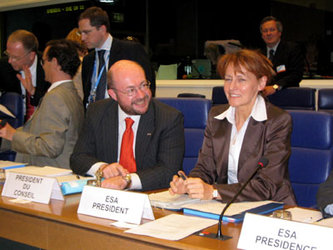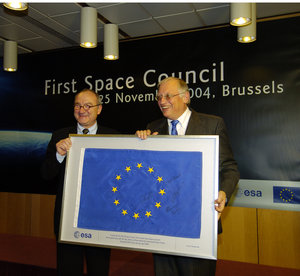Ministers meet to take forward the European Space Policy (5th Space Council)
ESA PR 40-2008. Ministers in charge of space activities within ESA and EU Member States met in Brussels today for the fifth Space Council(*).
Today’s Space Council was jointly chaired by French Minister of Higher Education and Research Valérie Pécresse, on behalf of the EU Competitiveness Council, and Maria Van Der Hoeven, Dutch Minister of Economic Affairs and current Chair of the ESA Council at Ministerial Level. Günter Verheugen, Vice President of the European Commission and Commissioner for Enterprise and Industry, and Jean-Jacques Dordain, ESA Director General, also took part.
Commenting on the outcome, Maria Van Der Hoeven said: “The Space Council has welcomed the progress made in the implementation of the European Space Policy over the last 16 months, and has identified further priority areas for its implementation. It is important that we maintain momentum.
"In particular, Europe needs to ensure that it delivers the flagship satellite applications programmes Galileo and Kopernikus. The Council has set out the requirements for an action plan on Kopernikus implementation, which should include sustainable funding, operational service delivery mechanisms, an approach for the overall governance of the system and of all its components and a comprehensive data policy. We will then address new priorities from a position of strength.

"Europe now has a stable foundation for its space activities, supported as they are by the three legs of the European Space Agency, the European Union and their respective Member States. This will be reinforced not only by today’s meeting but also by the ESA Council at Ministerial Level, which is due to take place on 25-26 November in The Hague."
The Space Council adopted a Resolution which highlights the significant advances in the two initial priorities and flagship space programmes of the European Space Policy, Galileo and Kopernikus(**).
The Space Council identified the need to draw up a plan that provides for sustainable operational funding for Kopernikus and welcomed the proposal by the European Commission to start this with a new preparatory action in the preliminary budgets for 2009. As to the R&D phases of the programme, the Council welcomed the ESA Director General’s intention to submit to the Ministers of its Member States, gathering in Council in The Hague in November of this year, a proposal for the subscription of the second segment of the Kopernikus Space Component that will make it possible to complete the development of most of the initial series of Sentinel satellites.
Regarding horizontal, cross-cutting aspects of the European Space Policy, the Space Council identified the need to further promote international cooperation in such domains as Solar System exploration, Earth environment and sustainable development. The Resolution also addressed the need to strengthen existing mechanisms for coordinating European expertise and investments in space as well as to set up mechanisms to improve synergies between civil and defence space programmes, respecting the specific requirements of both sectors, including their decision-making competences and finance schemes.

This Space Council meeting has also moved to widen the scope of and establish new priorities for the European Space Policy. Four additional priority areas have been identified: space and climate change, contributions of space to the Lisbon Strategy, space and security and space exploration.
The Space Council welcomed in particular the joint preparation by ESA and Eumetsat of an innovative programme proposal for Meteosat Third Generation, which will also contribute to Kopernikus, to the monitoring of climate and thus to the detection of global climate change.
The Space Council recognised the substantial contribution of space, as a high-tech R&D domain and through the economic exploitation of its results, to attaining the Lisbon goals and fulfilling the economic, educational, social and environmental ambitions of Europe and the expectations of its citizens. The development of services that seamlessly integrate navigation, observation and communication satellite systems and combine them with terrestrial networks will be promoted and accelerated.
On space and security, the Space Council highlighted the need to define ways and means to improve the coordination between civil and defence programmes through a structured dialogue among European institutional actors, including ESA. It also noted the intention of ESA’s Director General to submit a proposal for a programme on Space Situational Awareness, for subscription at the ESA Council at ministerial level in November. This programme will set the basis towards the development of a European capability for the monitoring and surveillance of the space infrastructure of Europe and of space debris.

On space exploration, in the wake of ESA’s successful Columbus and Automated Transfer Vehicle missions to the International Space Station, the Space Council affirmed that Europe is committed to playing a significant role in the international enterprise to explore the Solar System and to develop a deep understanding of the conditions required for life to prosper beyond our planet. It welcomed the European Commission proposal to organise a high level political conference, opening a public debate on the role that Europe ought to play in the pursuit of the long-term global vision for space exploration.
At the end of the 5th Space Council, ESA’s Director General Jean-Jacques Dordain said: ”Europe’s Ministers have renewed the momentum behind the European Space Policy. The European Commission and ESA are committed to delivering the flagship application programmes Galileo and GMES, now known as Kopernikus, which are crucial to the economic and environmental well-being of Europe and elsewhere.
"Beyond these first priorities, Ministers have given us clear orientations as to their next priorities. It is particularly significant that they have stressed their wish for ESA to be involved in the structured dialogue on space and security and for the Commission to address the political debate on Europe’s vision for its role in the exploration of space."
Note for editors
(*) The Space Council is the joint and concomitant meeting of the EU Council and of the ESA Council at Ministerial Level, as defined in the Framework Agreement between the European Community and ESA, which entered into force in May 2004. The Space Council first met in November 2004, followed by two meetings in 2005 and one in 2007, at which the European Space Policy was adopted.
Jointly drafted by the European Commission and ESA’s Director General and adopted in May 2007, the European Space Policy outlines the strategic guidelines for Europe’s future activities in space. The policy calls for a strengthening of Europe’s strategic approach to space and increased coordination in activities between the EU, ESA and their Member States and is supported by the European Space Programme, as a planning and strategic tool comprising all of Europe’s major space activities.
(**) The role of ESA in Galileo is well known: ESA acts as the European Commission’s procurement and design agent tasked with the deployment, by 2013, of a global navigation system composed of 30 dedicated satellites, a ground infrastructure with the main control centres in Europe and a network of dedicated stations deployed around the world.
Within Kopernikus, formerly known as GMES (Global Monitoring for Environment and Security), ESA plays the role of development and procurement agency for the space component through the Sentinel family of satellites and for the related ground segment. ESA is also the coordinator for all data access to the Sentinels and other missions, essentially those run by its Member States and Eumetsat.
For further information:
Franco Bonacina
Spokesman and Head of Media Relations Office
Communication and Knowledge Department
Phone: + 33 1 5369 7299
Queries: media @ esa.int















 Germany
Germany
 Austria
Austria
 Belgium
Belgium
 Denmark
Denmark
 Spain
Spain
 Estonia
Estonia
 Finland
Finland
 France
France
 Greece
Greece
 Hungary
Hungary
 Ireland
Ireland
 Italy
Italy
 Luxembourg
Luxembourg
 Norway
Norway
 The Netherlands
The Netherlands
 Poland
Poland
 Portugal
Portugal
 Czechia
Czechia
 Romania
Romania
 United Kingdom
United Kingdom
 Slovenia
Slovenia
 Sweden
Sweden
 Switzerland
Switzerland


































